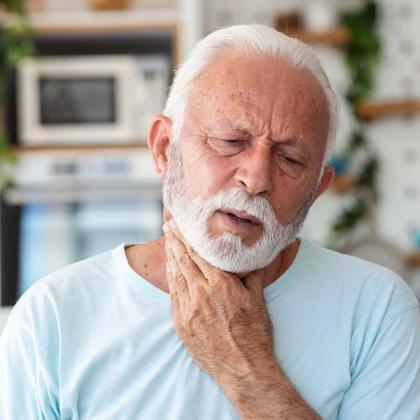This podcast episode is worth 0.27 CPD credits. Upgrade to Pro
The term goitre refers to an abnormal enlargement of the thyroid gland, typically caused by iodine deficiency or autoimmune diseases such as Graves' disease or Hashimoto's thyroiditis, as well as hormonal changes, thyroid nodules or thyroid cancer. Symptoms include a visible neck swelling, throat tightness, coughing, hoarseness and difficulty swallowing or breathing. Untreated goitre can lead to complications and thyroid dysfunction. The prevalence of goitre in the UK is lower than in many developing countries due to adequate dietary iodine intake, but it may still be seen in primary care. In this episode, Dr Roger Henderson looks at the diagnosis of goitre and the treatment options available, including observation, medication, radioactive iodine treatment and surgery.
Key references
- NICE. 2019. https://www.nice.org.uk/guidance/ng145.
- British Thyroid Foundation. 2022. https://www.btf-thyroid.org/thyroid-nodules-and-swellingsleaflet.
- NHS. 2022. https://www.nhs.uk/conditions/goitre/.
- The Royal Australian College of General Practitioners. 2012. https://www.racgp.org.au/afp/2012/august/goitre.
Key take-home points
- The term goitre simply refers to an enlarged thyroid gland.
- Common causes of goitre include thyroid nodules, autoimmune disease and iodine deficiency (rare in the UK).
- A goitre without nodules or hyperthyroidism is called a diffuse nontoxic or simple goitre. This is the most common type globally, caused by iodine deficiency.
- The other main type is a colloid goitre, with uniform follicles filled with colloid.
- Goitre usually presents as a neck mass; large masses may cause compressive symptoms such as dysphagia, breathing problems and cough. Symptoms of hyperthyroidism or hypothyroidism may also be present.
- A substernal goitre may obstruct the thoracic inlet. The Pemberton sign refers to faintness and facial congestion when the arms are raised above the head and draws the enlarged thyroid into the thoracic inlet.
- All patients with a goitre or thyroid nodules should have their thyroid-stimulating hormone (TSH) checked. If this is abnormal, free T4 and free T3 should be checked.
- Checking for anti-thyroid peroxidase and anti-thyroglobulin antibodies is recommended as thyroid autoimmunity may coexist.
- If the patient is hyperthyroid, TSH receptor antibody testing can help confirm Graves’ disease.
- If subnormal TSH is discovered, a radionuclide scan should be arranged along with specialist appraisal.
- Thyroid ultrasound in goitre is an essential imaging procedure and helps determine the need for fine-needle aspiration biopsy in patients with thyroid nodules.
- Goitres due to benign nodules or a euthyroid goitre can usually be simply observed clinically with a repeat ultrasound in 6–18 months.
- Patients with suspicious nodules or atypical cytology should be referred for specialist evaluation.
- Treatment options depend on the cause and clinical picture.
- These include simple observation, iodine supplementation, thyroxine suppression, thionamides, radioactive iodine (I-131) ablation and surgery.
- Asymptomatic euthyroid goitres can usually be observed without specific treatment.
- Iodine supplementation can reduce thyroid volume if goitre due to iodine deficiency but is not usually beneficial in other forms of goitre. High-dose iodine supplements should be avoided because of the risk of triggering an underactive or overactive thyroid gland.
- Thionamides such as carbimazole and propylthiouracil are used in patients with a goitre due to Graves’ disease and thyrotoxicosis.
- Radioactive iodine can be helpful in treating hyperthyroidism and reducing goitre size. This can cause hypothyroidism over time, so patients require an annual TSH test following this type of treatment.
- If medical therapy fails – or if compressive symptoms are present – then surgery is appropriate. In experienced hands, this is now a relatively low-risk procedure.
Create an account to add page annotations
Annotations allow you to add information to this page that would be handy to have on hand during a consultation. E.g. a website or number. This information will always show when you visit this page.
